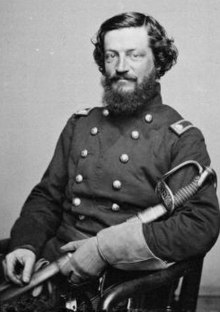Thomas L. Kane
| Thomas Leiper Kane | |
|---|---|

Thomas L. Kane
|
|
| Born |
January 27, 1822 Philadelphia, Pennsylvania |
| Died | December 26, 1883 (aged 61) Philadelphia, Pennsylvania |
| Place of burial | Kane Memorial Chapel, Kane, Pennsylvania |
| Allegiance | United States of America Union |
| Service/branch |
United States Army Union Army |
| Years of service | 1861 - 1863 |
| Rank |
|
| Commands held | 1st Pennsylvania Rifle Regiment |
| Battles/wars | American Civil War |
| Awards | Statue in the Utah State Capitol |
Thomas Leiper Kane (January 27, 1822 – December 26, 1883) was an American attorney, abolitionist, and military officer who was influential in the western migration of the Latter-day Saint movement and served as a Union Army colonel and general of volunteers in the American Civil War. He received a brevet promotion to major general for gallantry at the Battle of Gettysburg.
Kane was born in Philadelphia, Pennsylvania, to John Kintzing Kane, a U.S. district judge, and Jane Duval Leiper. His brother was naval officer, physician, and explorer Elisha Kent Kane. Kane was described as being of small stature, or "jockey-like," and food was always marginal. In correspondence, he referred to himself as an invalid. After receiving an American education, he went abroad to both study in Great Britain and France and to build up his constitution. During several years in Paris, he became proficient in the language and contributed articles to several French magazines.
Upon returning home, the younger Kane decided to study law and was admitted to the Pennsylvania bar in 1846. As a young man, he expressed interest in a political career and made an effort to obtain an appointment in the government of California when it came into U.S. possession. However, he was disappointed. He briefly clerked for his father, and then obtained a position as a Clerk of the District Court in eastern Pennsylvania. An abolitionist, Kane was distressed at the passage of the Compromise of 1850, which increased his legal responsibility to return fleeing slaves to southern territories under the Fugitive Slave Act. He almost immediately tendered his resignation to his father, who had the younger Kane jailed for contempt of court. The U.S. Supreme Court overruled this arrest.
...
Wikipedia
